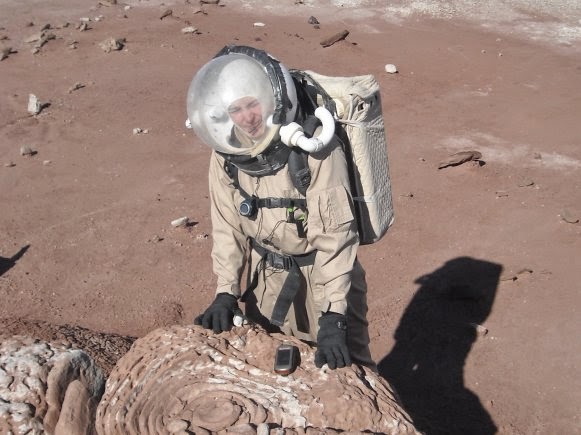A U.S. Army officer from the 20th CBRNE Command (Chemical, Biological,
Radiological, Nuclear, Explosives), stationed here, is in the running
for a one-way ticket to Mars.
The potential Martian colonist is 1st Lt. Heidi Beemer, the
decontamination platoon leader for the 63rd Chemical Company, 83rd
Chemical Battalion, 48th Chemical Brigade. The unit is part of the 20th
CBRNE Command, the U.S. Army's only formation that combats chemical,
biological, radiological, nuclear and explosive threats around the
globe.
Beemer has been accepted into the selection process for Mars One, a
Netherlands-based non-profit-sponsored mission to the Red Planet in
2025.
"This will be the most important feat man will ever partake in, and as a
representative I will have the opportunity to start the first global
civilization in which people from all cultural and socioeconomic
backgrounds come together with the common goal of representing Earth,"
said Beemer.
"Other benefits of this mission will affect life on Earth," said Beemer.
"Improvements will be seen in the field of medicine, water
conservation, food production, communication, and the list goes on and
on. This mission will not just touch the lives of those living on Mars,
but it will also be felt by all citizens of Earth for years to come."
Beemer is competing with more than 705 applicants from 99 different
countries for the Mars mission. Beemer said the next round of the
selection process will include interviews later this year.
Other American military personnel have applied for the program,
including a U.S. Navy SEAL, a U.S. Navy journalist, a U.S. Air Force
CV-22 Osprey pilot, a U.S. Army combat engineer and numerous pilots and
flight surgeons.
Beemer said the competition will narrow the field of applicants down to the final 24 Martian colonists.
The journey to Mars will take approximately seven months and the
colonists will travel in groups of four, with new groups arriving every
two years. Once on Mars, they will occupy living pods on the Red Planet.
Robots will build the living quarters and produce the oxygen and water
necessary for the first colonists.
Each additional group will bring more supplies with them.
To prepare for the mission to Mars where the weather can range from 95
degrees in the equatorial summer to -289 degrees at the winter polar
caps, Beemer trained as the executive commander and crew geologist at
the Mars Desert Research Station, in Utah.
The Virginia Military Institute graduate also recently participated in
the 17th Annual International Mars Society Convention in Houston, Texas,
where she and other applicants discussed why they want to participate
in the mission to Mars.
Beemer said her background as a Chemical Corps officer makes her ideally suited for the Mars mission.
"Being in the Chemical Corps has taught me how I react during adverse
situations," said Beemer. "Doing training like the toxic agent training
facility has given me confidence in my ability to react when the
environment outside of my suit and mask have the capability to kill me.
Knowing that I can calmly handle this pressure will be a distinct
advantage living and working on Mars."
Beemer said she has been interested in Mars since the Sojourner rover landed there, more than 17 years ago.
"My passion for Mars and space exploration began in 1997, when I was
eight years old," said Beemer, a Virginia Beach, Virginia native. "The
Sojourner rover landed on the Red Planet on July 4, 1997, and gave
humans a glimpse of the rust-colored Martian surface.
"I knew that Mars was going to be the future, and I felt called to be a
part of this important step for humanity. To most, the desolate
landscape of Mars is uninviting; to me it was the next frontier," said
Beemer. "I remember telling my eight-year-old self that the only way we
will find the answers locked inside of our solar system would be to
send humans -- to send me."
http://www.army.mil/article/132102/U_S__Army_officer_competes_for_one_way_ticket_to_Mars/
By Walter T. Ham IV, 20th CBRNE Command Public Affairs

No comments:
Post a Comment